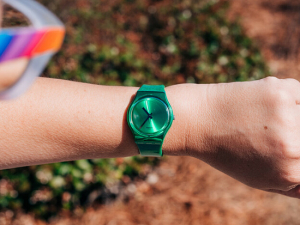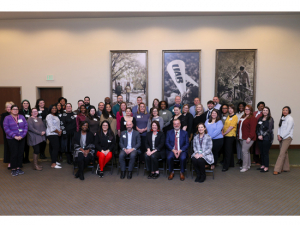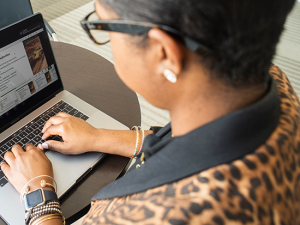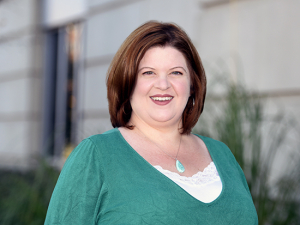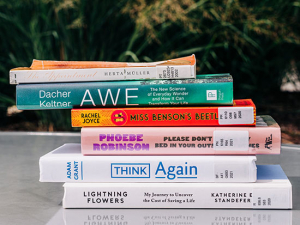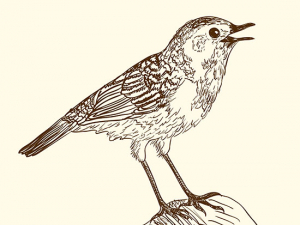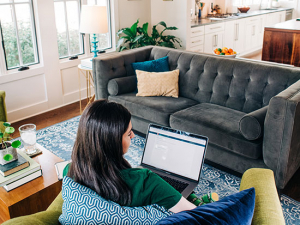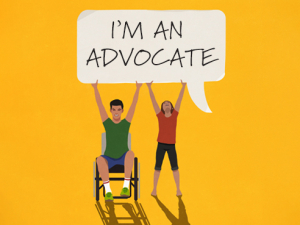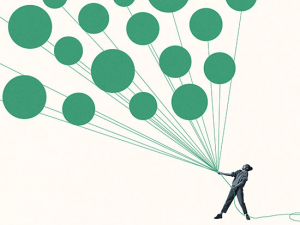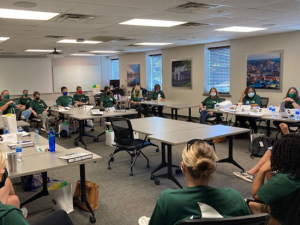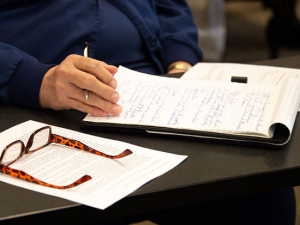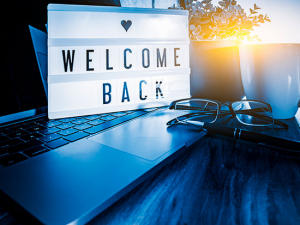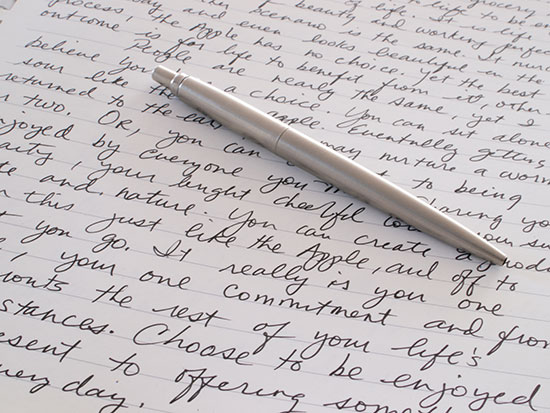 Louisa May Alcott, author of “Little Women,” kept a journal from age 11 until her very last days, including her brief but thrilling time volunteering at a Baltimore hospital during the Civil War, which she described as “leading a life of constant excitement in this great house.”
Louisa May Alcott, author of “Little Women,” kept a journal from age 11 until her very last days, including her brief but thrilling time volunteering at a Baltimore hospital during the Civil War, which she described as “leading a life of constant excitement in this great house.”
Sarah Nafziger, M.D., vice president for Clinical Operations at UAB Hospital, has spent two decades amid the adrenaline rush of emergency rooms. She would never claim to be an Alcott, although she is raising three teenage girls — “I pretty much live in a sorority house,” she said — and coping with the ups and downs of life by writing a journal of her own, along with separate journals she began to keep with memories for each of her children.
Nafziger is focused on memory, not style. “I describe it as an avalanche of words — I just get it on the paper,” she explained in April as the inaugural speaker for the new UAB Journaling Club. “Grammar rules are out the window, punctuation is gone — I don’t care. I just write it down and get it out of me. It’s such a release for me to get things on paper …. It takes the worry away that I will forget important things.” (We highly recommend watching Nafziger’s full talk, which is by turns hilarious and heart-rending but never less than honest. Click that link, log in with Blazer ID and click on "UAB Journaling Club Session: April 2023 video" on the right side of the screen to watch. If you are using a phone, scroll down and click the Start Learning Now button.)
The UAB Journaling Club grew out of a session during last year’s Wellness Week, organized by Learning and Development specialist Alison Kniseley in partnership with UAB Arts in Medicine Artist-in-Residence Salaam Green, an expressive writing coach and certified listener poet.
The second meeting of the UAB Journaling Club will be held 10:30 a.m. July 19. Register here.
During that session, Megan Hays, Ph.D., associate professor in the Department of Physical Education and Rehabilitation, explained why “journaling is one of life’s greatest wellness hacks,” and Green explained how expressing oneself through journaling can enhance well-being and the healing environment. Feedback from the session was so strong, Kniseley says, that she and Green partnered to turn it into a regular series, organized by UAB Learning and Development.
Good for your health
Evidence-based benefits of journaling include better memory function and improved recovery from traumatic events, Hays explained recently. (Nafziger clearly agrees.) Others include “reduced depression and anxiety symptoms, improved immune function [and] faster sleep onset in poor sleepers,” said Hays, a clinical psychologist and associate director of Education at the Heersink School of Medicine’s Office of Wellness.
“I have been journaling off and on since I was a kid,” Hays said. “I remember loving the idea of having a safe space to express myself freely from a young age and always loved getting a new (usually pretty) journal for a present growing up. These days, I find journaling helpful for processing the stressful events or problems that inevitably come up in life as an adult.”
Tapping the “power of small groups”
The “off and on” part of that quote is significant. During the Wellness Week talk, and at the first UAB Journaling Club meeting in April, Salaam Green guided attendees through a journaling session. Green, who conducts sessions on using art and health techniques to listen better, introduced herself to the group with a laugh as “your resident hypocrite journaler — I tell everyone to journal, and I don’t do it until I need to.” (Green’s reading of the poem “Bird,” by Liz Berry at the April 2023 meeting of the UAB Journaling Club follows Nafziger's talk and is well worth watching also. Log in with Blazer ID, click on "UAB Journaling Club Session: April 2023 video" on the right side of the screen, and skip to 19:30.)
Getting started
Salaam Green, artist-in-residence at UAB Arts in Medicine, shares some of the basic prompts she likes to use to spark journaling:
- Tell me more about what makes you feel alive.
- What questions do you need to ask in order to be or feel free?
- How did you get here?
- Who are your people?
- Where do we find belonging? How do we invite others into belonging?
- What gifts would you like to receive and offer to the world?
- When you leave the room, how do you hope others feel?
Part of the reason for launching the UAB Journaling Club was to help people take advantage of the power of self-expression by overcoming a common hurdle: actually starting to journal. “The best tip I can offer for getting started is to recognize that you will never find the time to get started,” Hays said. “Your calendar will never magically clear itself to make room for any new habit, as much as I like to pretend it will sometimes! You simply have to make the time for journaling by being intentional. Once you have set a goal for journaling, whether it be once a day or once a month, schedule and block off the time in your calendar as you would a doctor’s appointment …. I think one of the primary benefits of a journaling club is to help get people started and then help keep people accountable by serving as a reminder to keep the practice up each time you see it on your calendar. In the UAB Journaling Club, Salaam guides participants through a journaling session with prompts, meaning that time is actually set aside for the practice itself as long as you attend, so the group is definitely one way you can make the time for journaling.”
Also, Hays added: “There is a robust evidence base for the power of small groups to promote personal behavior change and improve health.”
“A space of belonging”
Green describes the UAB Journaling Club as “a space of belonging.” As she said in April: “I feel like I’m among kinfolks.” “I began journaling as a young girl,” she said recently. “I received my first journal from my mother, a pink journal with a golden key. I would go outside underneath an oak tree and journal with my dog …. This process became my way of making sense of the world, finding peace and falling in love with writing.” The journal, Green said, was a “space where I could express my voice.”
Staying motivated
“Many people fall into the all-or-nothing thinking trap after putting pressure on themselves to journal every single day,” said Megan Hays, Ph.D., clinical psychologist and associate director of Education for the Heersink School of Medicine’s Office of Wellness. “Life will inevitably happen, and they will miss a day — or a month — and get discouraged.”
Hays has two pieces of advice:
1. Something is better than nothing. Instead of going straight to a daily habit, “a better approach is to get started by setting a reasonable goal for yourself that you are very likely to achieve, and then gradually increase the goal through incremental change,” Hays said. “For example, you may start with a goal of journaling once a week for 15 minutes. Once you’ve achieved that, you may try twice a week for 20 minutes. Or you might just start with one day a month. There are no rules!”
2. Pair up. “One strategy I like from the habit literature is to ‘piggyback’ off existing habits,” Hays said. “For example, you may pair 10 minutes of journaling with your morning coffee.” Or, “if you always watch a TV series after dinner, try 15 minutes of journaling before you start the show.”
But she is not stuck to a set schedule. “I normally use journaling as a healing tool in my life,” Green said. “I go through spurts of journaling daily to only journaling to work through a problem or issue.”
After the first Journaling Club meeting, a faculty member posted on Facebook. After describing it as “an excellent time to reflect and write, then listen to others share their thoughts and struggles,” the faculty member said, “Journaling has been a lifeline to me for the last several years, and I’m happy that I now get to be part of a group that values journaling.”
That kind of feedback, and the large turnout at the first meeting, are gratifying, says Kniseley. The first UAB Journaling Club meeting had 66 attendees, Kniseley notes, and the second, which will be held Wednesday, July 19, at 10:30 a.m., has even more registrations. (The club is open to all UAB and UAB Medicine employees.)
During the meeting, Hays will discuss the benefits of journaling, Green will share prompts and attendees will have a few minutes to write. “I provide participants with two or three prompts or ideas, and they can choose which ones they feel aligned with or comfortable writing,” Green said. “The biggest takeaway, I hope, is that participants feel safe and brave to own the space.” After the brief journaling time, participants are free to share in the meeting chat or aloud. “No one has to write or share, or use the designed prompts,” Green pointed out. “They are there as a guide only.”
Self-discovery and gratitude
After two Zoom sessions, Kniseley is looking forward to holding the first in-person UAB Journaling Club meeting in September, titled “Creative Journaling for Self-Discovery and Well-Being.” The date for that meeting is still being determined; but an October session, on Zoom on Oct. 18, will focus on gratitude journaling. Kniseley, who has been practicing gratitude journaling for years, will speak at that event. “I started gratitude journaling as a way of changing my perspective,” she said. “If things are not going great today, you can look back at all the great things that have happened so far.”
Gratitude journaling is “particularly effective for me,” Hays added. It “can be as simple as writing down three things I am grateful for at the end of the day — or even just one thing is fine.”



